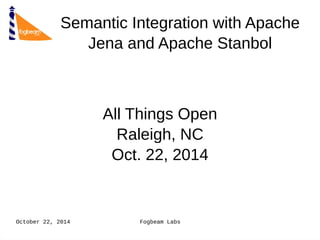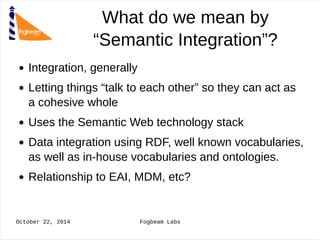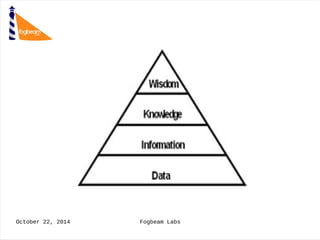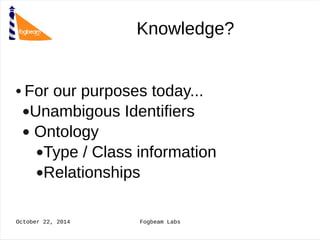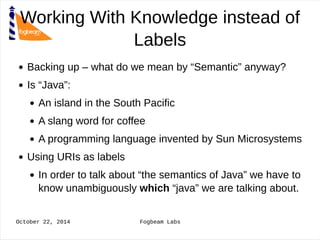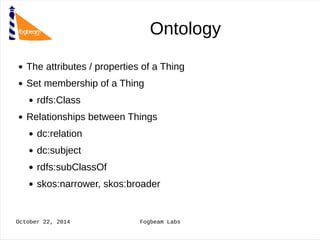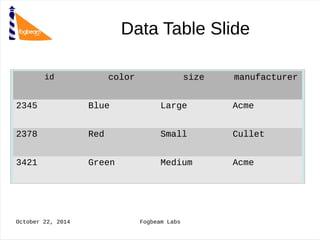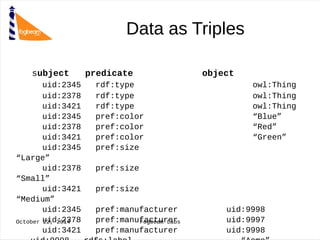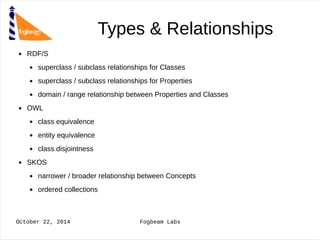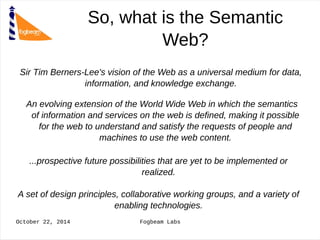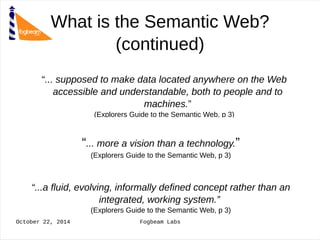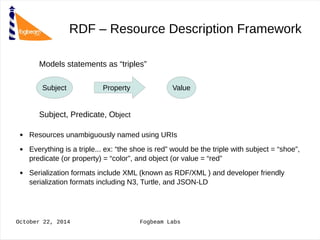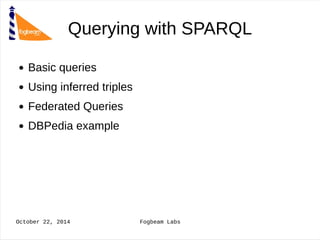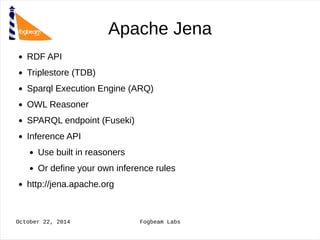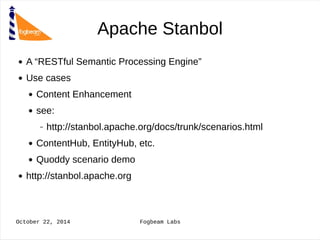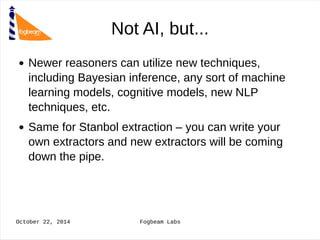Semantic Integration with Apache Jena and Stanbol
- 1. October 22, 2014 Fogbeam Labs Semantic Integration with Apache Jena and Apache Stanbol Semantic Integration with Apache Jena and Apache Stanbol All Things OpenAll Things Open Raleigh, NCRaleigh, NC Oct. 22, 2014Oct. 22, 2014
- 2. October 22, 2014 Fogbeam Labs OverviewOverview ● Theory (~10 mins)Theory (~10 mins) ● Application Examples (~10 mins)Application Examples (~10 mins) ● Technical Details (~25 mins)Technical Details (~25 mins)
- 3. October 22, 2014 Fogbeam Labs What do we mean by “Semantic Integration”? What do we mean by “Semantic Integration”? ● Integration, generallyIntegration, generally ● Letting things “talk to each other” so they can act as a cohesive whole Letting things “talk to each other” so they can act as a cohesive whole ● Uses the Semantic Web technology stackUses the Semantic Web technology stack ● Data integration using RDF, well known vocabularies, as well as in-house vocabularies and ontologies. Data integration using RDF, well known vocabularies, as well as in-house vocabularies and ontologies. ● Relationship to EAI, MDM, etc?Relationship to EAI, MDM, etc?
- 4. October 22, 2014 Fogbeam Labs Uses Semantic Web technology to do what, exactly? Uses Semantic Web technology to do what, exactly? ● Work with knowledge, not labelsWork with knowledge, not labels ● Express metadata about “things”Express metadata about “things” ● And the relationships between those “things” and their characteristics And the relationships between those “things” and their characteristics ● Reason about those “things” in order to:Reason about those “things” in order to: ● Find contextually relevant informationFind contextually relevant information ● Search with greater precisionSearch with greater precision ● Generate new knowledgeGenerate new knowledge ● ??????
- 5. October 22, 2014 Fogbeam Labs Knowledge?Knowledge? ● What's the difference between “Data”, “Information”, “Knowledge”, etc? What's the difference between “Data”, “Information”, “Knowledge”, etc? ● Different ways of talking about this.Different ways of talking about this. ● DIKW Pyramid is a popular modelDIKW Pyramid is a popular model ● http://en.wikipedia.org/wiki/DIKW_Pyramidhttp://en.wikipedia.org/wiki/DIKW_Pyramid
- 6. October 22, 2014 Fogbeam Labs
- 7. October 22, 2014 Fogbeam Labs Knowledge?Knowledge? ● For our purposes today...For our purposes today... ●Unambigous IdentifiersUnambigous Identifiers ● OntologyOntology ●Type / Class informationType / Class information ●RelationshipsRelationships
- 8. October 22, 2014 Fogbeam Labs Working With Knowledge instead of Labels Working With Knowledge instead of Labels ● Backing up – what do we mean by “Semantic” anyway?Backing up – what do we mean by “Semantic” anyway? ● Is “Java”:Is “Java”: ● An island in the South PacificAn island in the South Pacific ● A slang word for coffeeA slang word for coffee ● A programming language invented by Sun MicrosystemsA programming language invented by Sun Microsystems ● Using URIs as labelsUsing URIs as labels ● “java” we are talking about.which In order to talk about “the semantics of Java” we have to know unambiguously In order to talk about “the semantics of Java” we have to know unambiguously which “java” we are talking about.
- 9. October 22, 2014 Fogbeam Labs OntologyOntology ● The attributes / properties of a ThingThe attributes / properties of a Thing ● Set membership of a ThingSet membership of a Thing ● rdfs:Classrdfs:Class ● Relationships between ThingsRelationships between Things ● dc:relationdc:relation ● dc:subjectdc:subject ● rdfs:subClassOfrdfs:subClassOf ● skos:narrower, skos:broaderskos:narrower, skos:broader
- 10. October 22, 2014 Fogbeam Labs Data Table SlideData Table Slide id color size manufacturer 2345 Blue Large Acme 2378 Red Small Cullet 3421 Green Medium Acme
- 11. October 22, 2014 Fogbeam Labs Data as TriplesData as Triples ubject predicate objectssubject predicate object uid:2345 rdf:type owl:Thinguid:2345 rdf:type owl:Thing uid:2378 rdf:type owl:Thinguid:2378 rdf:type owl:Thing uid:3421 rdf:type owl:Thinguid:3421 rdf:type owl:Thing uid:2345 pref:color “Blue”uid:2345 pref:color “Blue” uid:2378 pref:color “Red”uid:2378 pref:color “Red” uid:3421 pref:color “Green”uid:3421 pref:color “Green” uid:2345 pref:size “Large” uid:2345 pref:size “Large” uid:2378 pref:size “Small” uid:2378 pref:size “Small” uid:3421 pref:size “Medium” uid:3421 pref:size “Medium” uid:2345 pref:manufacturer uid:9998uid:2345 pref:manufacturer uid:9998 uid:2378 pref:manufacturer uid:9997uid:2378 pref:manufacturer uid:9997 uid:3421 pref:manufacturer uid:9998uid:3421 pref:manufacturer uid:9998
- 12. October 22, 2014 Fogbeam Labs Types & RelationshipsTypes & Relationships ● RDF/SRDF/S ● superclass / subclass relationships for Classessuperclass / subclass relationships for Classes ● superclass / subclass relationships for Propertiessuperclass / subclass relationships for Properties ● domain / range relationship between Properties and Classesdomain / range relationship between Properties and Classes ● OWLOWL ● class equivalenceclass equivalence ● entity equivalenceentity equivalence ● class disjointnessclass disjointness ● SKOSSKOS ● narrower / broader relationship between Conceptsnarrower / broader relationship between Concepts ● ordered collectionsordered collections
- 13. October 22, 2014 Fogbeam Labs ButBut ● But... we're not here for a course on Epistemology or Metaphysics... But... we're not here for a course on Epistemology or Metaphysics...
- 14. October 22, 2014 Fogbeam Labs SynonymsSynonyms ● Smart DataSmart Data ● Semantic DataSemantic Data ● KnowledgeKnowledge
- 15. October 22, 2014 Fogbeam Labs Semantic Integration LayerSemantic Integration Layer Enterprise ApplicationsEnterprise Applications (ERP, SFA,(ERP, SFA, CRM, etc.)CRM, etc.) Document RepositoriesDocument Repositories DMS, Wikis, Blogs,DMS, Wikis, Blogs, Forums, Etc.Forums, Etc. “Big Data”“Big Data” Data Warehouses,Data Warehouses, Data Lakes, etc.Data Lakes, etc. Internet of Things,Internet of Things, M2M, Sensor DataM2M, Sensor Data etc.etc. “Open Data”“Open Data” SEC filingsSEC filings EPA dataEPA data building permits,building permits, etc.etc. StanbolStanbol JenaJena UsersUsers
- 16. October 22, 2014 Fogbeam Labs But wait, there's more...But wait, there's more... ● From relational database to Semantic Web -> R2RMLFrom relational database to Semantic Web -> R2RML ● D2RQD2RQ ● http://d2rq.orghttp://d2rq.org ● ANY23 – Anything to TriplesANY23 – Anything to Triples ● http://any23.apache.orghttp://any23.apache.org ● OpenRefine, Tika, JSoup, Boilerpipe, ...OpenRefine, Tika, JSoup, Boilerpipe, ... ● Potentially, anything that might be part of a normal ETL workflow Potentially, anything that might be part of a normal ETL workflow
- 17. October 22, 2014 Fogbeam Labs So, what is the Semantic Web? So, what is the Semantic Web? An evolving extension of the World Wide Web in which the semantics of information and services on the web is defined, making it possible for the web to understand and satisfy the requests of people and machines to use the web content. An evolving extension of the World Wide Web in which the semantics of information and services on the web is defined, making it possible for the web to understand and satisfy the requests of people and machines to use the web content. Sir Tim Berners-Lee's vision of the Web as a universal medium for data, information, and knowledge exchange. Sir Tim Berners-Lee's vision of the Web as a universal medium for data, information, and knowledge exchange. ...prospective future possibilities that are yet to be implemented or realized. ...prospective future possibilities that are yet to be implemented or realized. A set of design principles, collaborative working groups, and a variety of enabling technologies. A set of design principles, collaborative working groups, and a variety of enabling technologies.
- 18. October 22, 2014 Fogbeam Labs What is the Semantic Web? (continued) What is the Semantic Web? (continued) ” ... supposed to make data located anywhere on the Web accessible and understandable, both to people and to machines. ““... supposed to make data located anywhere on the Web accessible and understandable, both to people and to machines.” (Explorers Guide to the Semantic Web, p 3)(Explorers Guide to the Semantic Web, p 3) ”... more a vision than a technology.““... more a vision than a technology.” (Explorers Guide to the Semantic Web, p 3)(Explorers Guide to the Semantic Web, p 3) “...a fluid, evolving, informally defined concept rather than an integrated, working system.” “...a fluid, evolving, informally defined concept rather than an integrated, working system.” (Explorers Guide to the Semantic Web, p 3)(Explorers Guide to the Semantic Web, p 3)
- 19. October 22, 2014 Fogbeam Labs The “Semantic Web Layer Cake”The “Semantic Web Layer Cake”
- 20. October 22, 2014 Fogbeam Labs RDF – Resource Description FrameworkRDF – Resource Description Framework ● Resources unambiguously named using URIsResources unambiguously named using URIs ● Everything is a triple... ex: “the shoe is red” would be the triple with subject = “shoe”, predicate (or property) = “color”, and object (or value = “red” Everything is a triple... ex: “the shoe is red” would be the triple with subject = “shoe”, predicate (or property) = “color”, and object (or value = “red” ● Serialization formats include XML (known as RDF/XML ) and developer friendly serialization formats including N3, Turtle, and JSON-LD Serialization formats include XML (known as RDF/XML ) and developer friendly serialization formats including N3, Turtle, and JSON-LD SubjectSubject PropertyProperty ValueValue bjectSubject, Predicate, OSubject, Predicate, Object Models statements as “triples”Models statements as “triples”
- 21. October 22, 2014 Fogbeam Labs Reasoning over dataReasoning over data ● OWL / SKOS / etc.OWL / SKOS / etc. ● Ability to access “Inferred” triplesAbility to access “Inferred” triples
- 22. October 22, 2014 Fogbeam Labs Common VocabulariesCommon Vocabularies ● FOAFFOAF ● SKOSSKOS ● DOAPDOAP ● Dublin CoreDublin Core ● Etc.Etc.
- 23. October 22, 2014 Fogbeam Labs Querying with SPARQLQuerying with SPARQL ● Basic queriesBasic queries ● Using inferred triplesUsing inferred triples ● Federated QueriesFederated Queries ● DBPedia exampleDBPedia example
- 24. October 22, 2014 Fogbeam Labs Semantic Integration in the Enterprise Semantic Integration in the Enterprise ● Knowledge ManagementKnowledge Management ● CollaborationCollaboration ● BPMBPM ● Business IntelligenceBusiness Intelligence ● Predictive AnalyticsPredictive Analytics
- 25. October 22, 2014 Fogbeam Labs Apache JenaApache Jena ● RDF APIRDF API ● Triplestore (TDB)Triplestore (TDB) ● Sparql Execution Engine (ARQ)Sparql Execution Engine (ARQ) ● OWL ReasonerOWL Reasoner ● SPARQL endpoint (Fuseki)SPARQL endpoint (Fuseki) ● Inference APIInference API ● Use built in reasonersUse built in reasoners ● Or define your own inference rulesOr define your own inference rules ● http://jena.apache.orghttp://jena.apache.org
- 26. October 22, 2014 Fogbeam Labs Apache StanbolApache Stanbol ● A “RESTful Semantic Processing Engine”A “RESTful Semantic Processing Engine” ● Use casesUse cases ● Content EnhancementContent Enhancement ● see:see: – http://stanbol.apache.org/docs/trunk/scenarios.htmlhttp://stanbol.apache.org/docs/trunk/scenarios.html ● ContentHub, EntityHub, etc.ContentHub, EntityHub, etc. ● Quoddy scenario demoQuoddy scenario demo ● http://stanbol.apache.orghttp://stanbol.apache.org
- 27. October 22, 2014 Fogbeam Labs Not AI, but...Not AI, but... ● Newer reasoners can utilize new techniques, including Bayesian inference, any sort of machine learning models, cognitive models, new NLP techniques, etc. Newer reasoners can utilize new techniques, including Bayesian inference, any sort of machine learning models, cognitive models, new NLP techniques, etc. ● Same for Stanbol extraction – you can write your own extractors and new extractors will be coming down the pipe. Same for Stanbol extraction – you can write your own extractors and new extractors will be coming down the pipe.

